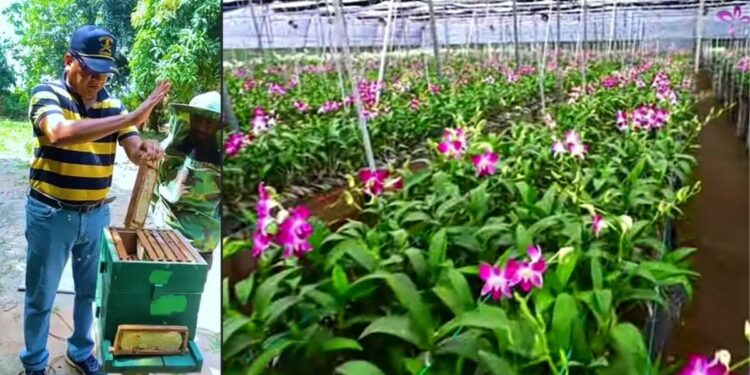After serving in the army for 22 years, Colonel Sujan Mohanty, a former soldier, set out to build a prosperous life for himself. He never thought of settling in abroad or spend the rest of his life after retirement relax in a farm house. He did the unconventional. He went on to make a living by cultivating an orchid farm.
The farm, known as “Orchid n More,” is situated around 23 kilometres from Bhubaneswar, Odisha, in Kantapada village, close to Chandaka Wildlife Sanctuary.
His business has amassed a yearly revenue of about Rs 15 lakh with the assistance of his wife, Monalisa Mohanty, a feat they were able to accomplish in roughly two and a half years.
Sujan discusses the qualities needed to make orchid growing a lucrative profession, despite the fact that it is not an easy task.
“One should be persistent and patient and I have also been instilled with these characteristics as the wife of an army man. In both his personal and professional life, I must serve as a strong support system” says Monalisa.
Sujan, however, didn’t always have it easy before he made the decision to cultivate orchids, a business that is completely foreign to him. But as his idea took hold thanks to his unwavering dedication and resolve, there was no going back.
After his retirement in 2012, Sujan was unsure of his future. He wanted to start a new business but was overwhelmed by the variety of alternatives. But he was more interested in floriculture.
“I can’t just sit around as an army man. The occupations not only kept me occupied, but they also offered me time to learn about other floricultures, says” Sujan.
But there was a problem. He was kept busy by the persistent want to take action on his own. He kept reading, browsing the internet, debating, and talking with his wife and friends about various business venture ideas. The Mohantys focused solely on orchid growing in 2017.

“At one point, I experimented with growing roses. I decided on this alternative after learning that a plucked rose only lasts two to three days but an orchid’s vase, a setup of coconut husks where orchids grow, lasts 20 to 30 days, according to Sujan.

But he faced a major issue that he didn’t have any land or resources to support the proposal.
Sujan was determined. He met with specialists from the Odisha University of Agriculture and Technology (OUAT) and several orchid producers in Huma in the Ganjam district.
“My wife and I travelled for eight months through India in 2018 to meet the farmers and learn the skill firsthand,” he claims.
They visited Siliguri in Assam, Shillong in Meghalaya, and Baramati in Pune in Maharashtra, among other sites.
The pair prepared to enter the world of farming. They leased a 2,500 square metre plot of land from a Kantabada farm with a total area of around 15 acres.
They next obtained a loan from the Khordha district’s horticulture department for roughly Rs 24 lakh, with a 50 percent subsidy.
The couple met Dr Debasish Mishra, Khordha’s assistant director (horticulture), who explained how the programme operates.
“Under the Protected Cultivation Component of Mission for Integrated Development of Horticulture (MIDH) of the central government, the scheme promotes different horticulture sectors that include flowers, aromatic plants, vegetables, tuber crops roots, and mushrooms,” he claims.
Sujan made use of the advantages of this programme and built a polyhouse on the property to house orchid saplings. A polyhouse is a sort of specialised building that uses controlled climatic conditions for plant growth.
When the humidity is between 40 and 70 percent and the temperature is between 20 and 25 degrees Celsius, flowers like orchids can thrive in a polyhouse. Additionally, a micro-irrigation setup is a useful addition because orchids use little water. Although it varies from species to species, it might be challenging to quantify the water requirement, according to Dr. (Prof.) Sharat Chandra Sahoo of the OUAT department of fruit science and horticulture.
The Mohantys then went to Bengaluru to purchase white and purple orchid saplings because that city has the best selection of orchids. To start the farm, they employed about 25 local labour.
They were worried that wild animals like elephants, boars, and deer might show up and destroy the plan because Chandaka Wildlife Sanctuary flanked the property. Another significant problem that plagued Sujan was the prevalence of poisonous snakes.
“I spent roughly Rs 6 lakh to erect a solar fence around the polyhouse. At their entrances, I placed pots filled with carbolic acid, the odour of which is said to deter snakes. I found this knowledge online,” said Sujan
Given that it took the orchids in the polyhouse ten months to begin blooming, the odds were still stacked against him. They were little and didn’t fit the flower’s aesthetic.
We presented our orchids to policemen, health workers and other frontline warriors as a mark of respect for their selfless service during this trying time. We were able to sustain ourselves on my husband’s pension and the money we saved.,” she says.
Sujan has made the decision to extend the orchid farm by leasing a second patch measuring 2,500 square metres next to his current plot. To that end, he has already submitted an application for a loan of approximately Rs 55 lakh with a 50% subsidy.
He says that the Mukhyamantri Krushi Udyog Yojana, a state government project, is funded by the Agricultural Promotion and Investment Corporation, a state government undertaking.
Colonel Sujan is now focusing on apiculture, or beekeeping, even if his primary area of interest is floriculture.
He had acquired 15 boxes of bees as well as colonies when he first began the orchid farm. Each of these items cost Rs 4,000. He later added an additional 25 colonies.
The first batch’s honey sells for Rs 1,200 per litre, making an annual profit of approximately Rs 2.5 lakh. According to Sujan, both of these practises have greatly helped one another. Through pollination, the apiculture has increased orchid production by 20%, he continues.
My wife and I currently instruct farmers and interns at OUAT and the Siksa ‘O’ Anusandhan orchid growing and apiculture facility. We have briefed over 15 batches of farmers and interns to date,” he continues, pleased that he was able to realise his entrepreneurial dream.


















Discussion about this post